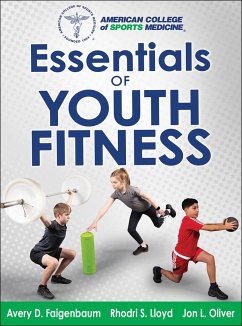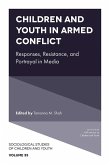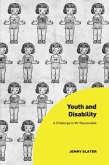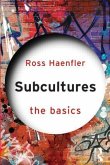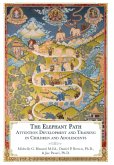- Gebundenes Buch
- Merkliste
- Auf die Merkliste
- Bewerten Bewerten
- Teilen
- Produkt teilen
- Produkterinnerung
- Produkterinnerung
ACSM's Essentials of Youth Fitness is the authoritative guide on motor skill development, aerobic and anaerobic conditioning, and strength, power, speed and agility training for young athletes.
Andere Kunden interessierten sich auch für
![Youth Participation and Democracy Youth Participation and Democracy]() Eeva Luhtakallio (University of Helsinki)Youth Participation and Democracy144,99 €
Eeva Luhtakallio (University of Helsinki)Youth Participation and Democracy144,99 €![Children and Youth in Armed Conflict Children and Youth in Armed Conflict]() Children and Youth in Armed Conflict153,99 €
Children and Youth in Armed Conflict153,99 €![Youth and Disability Youth and Disability]() Jenny SlaterYouth and Disability64,99 €
Jenny SlaterYouth and Disability64,99 €![Refugee Youth Refugee Youth]() Refugee Youth58,99 €
Refugee Youth58,99 €![Subcultures: The Basics Subcultures: The Basics]() Ross HaenflerSubcultures: The Basics29,99 €
Ross HaenflerSubcultures: The Basics29,99 €![The Elephant Path The Elephant Path]() Michelle BissantiThe Elephant Path66,99 €
Michelle BissantiThe Elephant Path66,99 €![Generation Z Generation Z]() Chloe CombiGeneration Z20,99 €
Chloe CombiGeneration Z20,99 €-
-
-
ACSM's Essentials of Youth Fitness is the authoritative guide on motor skill development, aerobic and anaerobic conditioning, and strength, power, speed and agility training for young athletes.
Hinweis: Dieser Artikel kann nur an eine deutsche Lieferadresse ausgeliefert werden.
Hinweis: Dieser Artikel kann nur an eine deutsche Lieferadresse ausgeliefert werden.
Produktdetails
- Produktdetails
- Verlag: Human Kinetics Publishers
- Seitenzahl: 448
- Erscheinungstermin: 20. Dezember 2019
- Englisch
- Abmessung: 287mm x 222mm x 38mm
- Gewicht: 1476g
- ISBN-13: 9781492525790
- ISBN-10: 1492525790
- Artikelnr.: 57118396
- Herstellerkennzeichnung
- Produktsicherheitsverantwortliche/r
- Europaallee 1
- 36244 Bad Hersfeld
- gpsr@libri.de
- Verlag: Human Kinetics Publishers
- Seitenzahl: 448
- Erscheinungstermin: 20. Dezember 2019
- Englisch
- Abmessung: 287mm x 222mm x 38mm
- Gewicht: 1476g
- ISBN-13: 9781492525790
- ISBN-10: 1492525790
- Artikelnr.: 57118396
- Herstellerkennzeichnung
- Produktsicherheitsverantwortliche/r
- Europaallee 1
- 36244 Bad Hersfeld
- gpsr@libri.de
The American College of Sports Medicine (ACSM), founded in 1954, is the largest sports medicine and exercise science organization in the world. With more than 50,000 members and certified professionals worldwide, ACSM is dedicated to improving health through science, education, and medicine. ACSM members work in a wide range of medical specialties, allied health professions, and scientific disciplines. Members are committed to the diagnosis, treatment, and prevention of sport-related injuries and the advancement of the science of exercise. The ACSM promotes and integrates scientific research, education, and practical applications of sports medicine and exercise science to maintain and enhance physical performance, fitness, health, and quality of life. Avery Faigenbaum, EdD, is a full professor in the department of health and exercise science at The College of New Jersey. His research interests focus on pediatric exercise science, resistance exercise, and preventive medicine, and he is devoted to bridging the gap between the laboratory and the playing field. As an active researcher and practitioner, Faigenbaum has coauthored over 240 peer-reviewed publications, 45 book chapters, and 10 books, including Youth Strength Training, Strength and Power for Young Athletes, and Progressive Plyometrics for Kids. He has been an invited speaker at more than 300 conferences throughout the world. Faigenbaum is a fellow of the American College of Sports Medicine (ACSM) and of the National Strength and Conditioning Association (NSCA), and he serves as associate editor of Pediatric Exercise Science and the Journal of Strength and Conditioning Research. He was elected vice president of the NSCA in 2005 and served on the Massachusetts Governor’s Committee on Physical Fitness and Sports from 1998 to 2004. Faigenbaum was awarded the Boyd Epley Award for Lifetime Achievement from the NSCA in 2017. Rhodri Lloyd, PhD, is a reader in pediatric strength and conditioning and the chair of the Youth Physical Development Centre at Cardiff Metropolitan University. He also holds a research associate position with Auckland University of Technology. Lloyd’s research interests surround the impact of growth and maturation on long-term athletic development and the neuromuscular mechanisms underpinning training adaptations in youth. To date he has published in excess of 90 peer-reviewed publications and more than 20 book chapters on the topics of youth fitness and pediatric strength and conditioning. He is a senior associate editor for the Journal of Strength and Conditioning Research and an associate editor for the Strength and Conditioning Journal. In 2016, he received the Strength and Conditioning Coach of the Year award for research and education from the UK Strength and Conditioning Association, and in 2017 he was awarded the Terry J. Housh Outstanding Young Investigator Award from the National Strength and Conditioning Association (NSCA). In 2019, he was again recognized by the NSCA, receiving both the Journal of Strength and Conditioning Research Editorial Excellence Award and Educator of the Year Award. Jon Oliver, PhD, is a professor of applied pediatric exercise science at Cardiff Metropolitan University, where he cofounded the Youth Physical Development Centre. He is also an adjunct professor at the Sport Performance Research Institute New Zealand (SPRINZ). His research focuses on youth physical development across performance, injury, and health perspectives, with an emphasis on the role of strength and conditioning to promote athletic development at all levels. He has published over 100 international peer-reviewed articles, contributed to international position and consensus statements, and authored numerous book chapters. Oliver’s research has been influential in informing both academics and practitioners on factors related to the development of physical fitness in youth. This has included developing coach education materials for professional sports organizations and national governing bodies. His research is supported by a network of research students and is built on collaborations with professional sports organizations and pediatric exercise scientists, both in the United Kingdom and in other countries.
Part I. Fundamental Concepts
Chapter 1. Physical Activity and Children’s Health
Chapter 2. Principles of Pediatric Exercise Science
Chapter 3. Growth, Maturation, and Physical Fitness
Chapter 4. Long-Term Athletic Development
Chapter 5. Pedagogy for Youth Fitness Specialists
Part II. Youth Fitness Development
Chapter 6. Assessing Youth Fitness
Chapter 7. Dynamic Warm-Up and Flexibility
Chapter 8. Motor Skill Training
Chapter 9. Strength and Power Training
Chapter 10. Speed and Agility Training
Chapter 11. Aerobic and Anaerobic Training
Chapter 12. Integrative Program Design
Part III. Contemporary Issues
Chapter 13. Young Athletes and Sport Participation
Chapter 14. Exercise for Overweight and Obese Youth
Chapter 15. Exercise for Youth With Selected Clinical Conditions
Chapter 16. Nutrition for Youth
Chapter 1. Physical Activity and Children’s Health
Chapter 2. Principles of Pediatric Exercise Science
Chapter 3. Growth, Maturation, and Physical Fitness
Chapter 4. Long-Term Athletic Development
Chapter 5. Pedagogy for Youth Fitness Specialists
Part II. Youth Fitness Development
Chapter 6. Assessing Youth Fitness
Chapter 7. Dynamic Warm-Up and Flexibility
Chapter 8. Motor Skill Training
Chapter 9. Strength and Power Training
Chapter 10. Speed and Agility Training
Chapter 11. Aerobic and Anaerobic Training
Chapter 12. Integrative Program Design
Part III. Contemporary Issues
Chapter 13. Young Athletes and Sport Participation
Chapter 14. Exercise for Overweight and Obese Youth
Chapter 15. Exercise for Youth With Selected Clinical Conditions
Chapter 16. Nutrition for Youth
Part I. Fundamental Concepts
Chapter 1. Physical Activity and Children’s Health
Chapter 2. Principles of Pediatric Exercise Science
Chapter 3. Growth, Maturation, and Physical Fitness
Chapter 4. Long-Term Athletic Development
Chapter 5. Pedagogy for Youth Fitness Specialists
Part II. Youth Fitness Development
Chapter 6. Assessing Youth Fitness
Chapter 7. Dynamic Warm-Up and Flexibility
Chapter 8. Motor Skill Training
Chapter 9. Strength and Power Training
Chapter 10. Speed and Agility Training
Chapter 11. Aerobic and Anaerobic Training
Chapter 12. Integrative Program Design
Part III. Contemporary Issues
Chapter 13. Young Athletes and Sport Participation
Chapter 14. Exercise for Overweight and Obese Youth
Chapter 15. Exercise for Youth With Selected Clinical Conditions
Chapter 16. Nutrition for Youth
Chapter 1. Physical Activity and Children’s Health
Chapter 2. Principles of Pediatric Exercise Science
Chapter 3. Growth, Maturation, and Physical Fitness
Chapter 4. Long-Term Athletic Development
Chapter 5. Pedagogy for Youth Fitness Specialists
Part II. Youth Fitness Development
Chapter 6. Assessing Youth Fitness
Chapter 7. Dynamic Warm-Up and Flexibility
Chapter 8. Motor Skill Training
Chapter 9. Strength and Power Training
Chapter 10. Speed and Agility Training
Chapter 11. Aerobic and Anaerobic Training
Chapter 12. Integrative Program Design
Part III. Contemporary Issues
Chapter 13. Young Athletes and Sport Participation
Chapter 14. Exercise for Overweight and Obese Youth
Chapter 15. Exercise for Youth With Selected Clinical Conditions
Chapter 16. Nutrition for Youth

